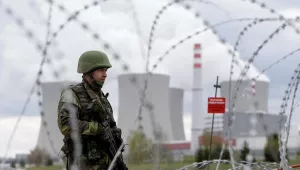“Embattled Presidencies” by Xenia Dormandy
TWO COUNTRIES, across the globe from one another, with different systems, undergoing political and military trauma. Two presidents embattled domestically and internationally. But two very different futures.
Since September 2001, when Pakistani President Pervez Musharraf chose to support the United States rather than the Taliban, he and President Bush have maintained a close relationship. In fact, Musharraf was the first leader to congratulate Bush after his 2004 reelection. They have weathered the storms together: the assassination attempts against Musharraf, Bush's reelection, the ups and downs of Afghanistan. Perhaps this relationship is helping them now to better understand the current political upheavals that both are going through.
Election season is on in both countries. Despite the distinct differences between the two democracies (or in one case quasi-democracy), the pounding that both leaders are taking is not dissimilar. In the United States it is taking place at the political level and in-country. In Pakistan, the nature of the system has forced the dialogue outside.
Musharraf has effectively (albeit not literally) exiled his two leading competitors , Benazir Bhutto and Nawaz Sharif. Both lead secular parties and both have led the country in the past. Bhutto, who faces corruption charges, could be jailed if she returns to Pakistan, and Sharif has been exiled to Saudi Arabia and disqualified from office until 2021. Nevertheless, they both continue to run parties from exile and take potshots at Musharraf wherever possible.
There are plenty of opportunities. In December 2003, General Musharraf promised the religious coalition (the Muttahida Majlis-e-Amal) that he would take off his uniform by December 2004 if he stayed on as president. He did not. Over the past year, Musharraf's staff has intimated that if he wins reelection later this year he will once again retain the uniform and thus leadership of the military. Unlike in the United States, Musharraf would combine the presidency with being a military, rather than a civilian, commander in chief.
Musharraf also looks likely to conduct the presidential elections before the parliamentary elections to ensure that he is reelected by the current parliament, which he largely controls. This plan must be supported by the Supreme Court of Pakistan. Oddly enough the head of the Supreme Court, Iftikhar Mohammad Chaudhry, was recently dismissed and is facing charges of impropriety. Chaudhry has also shown significant independence from the administration during his tenure. His absence will almost certainly make it simpler to enact the changes Musharraf demands.
The reaction in Pakistan is not dissimilar to that in the United States regarding the dismissal of eight US attorneys. The politicians are up in arms, joined by much of the public, who find abhorrent even the intimation that two supposedly independent branches of government (the administration and the judiciary) are intertwined. In Pakistan too, the politicians are complaining and the legal community is angry. But in Pakistan this means they are on the streets; pursuing a fix through the political system is not viable.
The similarities do not end here. Bush and his administration are being attacked domestically regarding policy in Iraq, and the international community is bringing pressure to bear. Musharraf, on the other hand, is under threat regarding his military activities against Al Qaeda and the Taliban, with many Pakistanis loudly condemning his actions against their "Pashtun brethren," and he is fighting to retain one of Pakistan's four provinces, Baluchistan, against an armed independence movement. He too is subject to pressure from without, with many questioning his support of the war against terrorism.
While the disparities in the two leaders' situations are great and should not be underestimated, it is interesting to recognize also the similarities. Bush's future is clear, however -- come early 2009 he will step down. There is much more uncertainty for Musharraf. He will win the upcoming election (by fair or foul means) and retain his uniform. Only two scenarios would lead to his stepping down: pressure from his military (it would not be the first time that the army forced a president out) or the eventual success of an assassination attempt. Would that Pakistan too were more susceptible to political pressure.
Dormandy, Xenia. “Embattled Presidencies.” The Boston Globe, April 27, 2007




